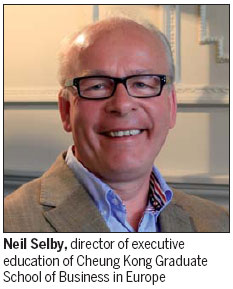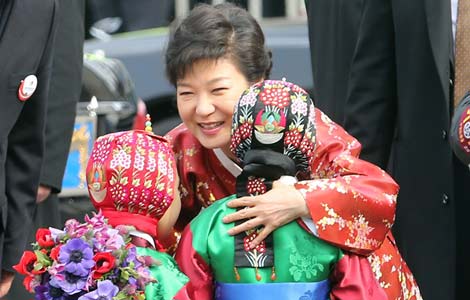Learning from each other's experience
Updated: 2013-06-12 13:39
By Cecily Liu (China Daily)
|
||||||||
|
A three-and-half-day executive program will be taught on the Lausanne campus of the Swiss business school IMD in September. Provided to China Daily |
Business school takes leading Chinese and Western experiences back to the classroom
A key barrier to business partnerships between Chinese and Western entrepreneurs is the differences that both parties perceive separate them, says Neil Selby. But he and his team have devised a pioneering strategy to deal with it.
"The big challenge about globalization is to get people to let go of their preconceptions," says Selby, director of executive education of Cheung Kong Graduate School of Business in Europe.
 |
"There may be certain differences in etiquettes of Eastern and Western business cultures, but fundamentally a lot of their values are the same."
Selby, who left his previous job as international director at Oxford Said Business School in November 2011 to help the Chinese business school launch its European operations, says the new experience has been a steep learning curve.
With Oliver Shiell, who also left Said to join CKGSB, Selby heads a new course, called the China Strategy Challenge, to bring together Chinese and European entrepreneurs to examine and deal with the preconceptions they have of one another.
"We ask the Chinese and European students to come up with preconceptions of each other, and then we bring the two groups together, and let them confront the preconception the other group came up with," Selby says.
"And it is quite a shock. And then from the shock, you then build. It's actually what eats away at the previous mindset you have. You probably have held that view for 20 years, and in the joint sessions you have something new."
The three-and-half-day executive program was first taught at Judge Business School in Cambridge in November. A similar course will take place on the Lausanne campus of the Swiss business school IMD in September.
After preconceptions are demolished in the initial confrontation, students are asked to look at case studies of Chinese and European businesses' interactions, and other more conventional course materials, Selby says.
"The new model entering into your head, you see how they are leveraged into other situations, and what worked and what didn't."
The program also attracts many thought leaders as students, which is less common in Western business schools, Shiell says.
The course in Cambridge in November attracted 30 European CEOs, including Sir Tom Hunter, once Scotland's richest man and a well-known philanthropist, and Lord Charles Aldington, former chairman of Deutsche Bank.
Shiell says Western business schools are founded on a tradition of educating mid-tier management people, typically those who have worked for a few years and want to gain a more holistic understanding of management theories before returning to the business world.
Chinese business schools have a tradition of educating thought leaders in society, he says, and he hopes CKGSB's entry into Europe will lead to a change there.
CKGSB, which was set up more than 10 years ago with the financial backing of the Li Ka-Shing Foundation, prides itself on teaching China's business elite through its Chinese EMBA programs.
"CKGSB has a decade of experience teaching C-suite executives who have run multi-billion-dollar organizations," Shiell says. "This is unusual for Western business schools, as they have not educated that segment of corporate elite."
Bringing Western corporate elite into CKGSB's European program is important because the ability of these executives to recognize China's importance will help other Western executives do likewise, Shiell says.
Another interactive element of the course is asking Western executives on the program to teach the Chinese executives and share their life stories with them, Selby says.
"For example, we asked Sir Tom Hunter to give a lesson on philanthropy, but we briefed him carefully and asked him to tell his life story. The Chinese entrepreneurs realized this is not someone lecturing them, but someone who is like them."
Hunter, 52, founded his own business, Sports Division, in 1984. The business quickly grew, but was acquired by competitor JJB Sports in 1998 for 290 million pounds ($442 million; 343 million euros), of which Hunter's share was 252 million pounds.
He initially set up The Hunter Foundation in 1998 with 10 million pounds as a tax management vehicle. but later his philanthropic work grew, and in 2005 he received a knighthood for his philanthropic work.
Selby says Hunter is someone who "has discovered the truth" and served as a great inspiration to Chinese entrepreneurs who are struggling with the same moral issue of philanthropy.
"China is wrestling with the issue of philanthropy itself. After Sir Tom Hunter's talk, there was a positively engaged conversation about what doing good is from a Chinese perspective. There was an exchange of views."
Another example of this exchange was a European branding expert on the course who talked to the Chinese students about his experience.
"He told a rags-to-riches story," Selby says. "He didn't go to university, but he knew he could write. So he sat up his own copywriting agency, and has gone through the slings and arrows of outrageous fortune."
After listening to the story, the Chinese executives shared with him their own brand requirements. The branding expert then led an exercise with the Chinese executives to explore how they could brand their products.
Cheung Kong is not the first Chinese business school to launch an executive program outside China.
China Europe International Business School, based in Shanghai, started working with foreign business schools more than 10 years ago, says senior national marketing manager Cathy Liu.
"We have always been an internationally focused business school because we understand it is important to provide our students a global perspective in their studies."
One example of an international program offered by CEIBS, jointly with the Harvard and IESE business schools, is the Global CEO Program, started in 2006. Participants complete three modules of studies, one at CEIBS, the second at IESE Business School in Spain, and the third at Harvard Business School in the US.
"The syllabus is designed jointly by professors from all three schools," Liu says. "They hold meetings every year to discuss how the course can be improved the following year to reflect the ever-changing market and learning demand of top Chinese executives."
Another example is Doing Business in Europe, a one-week course jointly run by CEIBS and INSEAD of France, which began last year and is hosted at INSEAD in France. The program has attracted several well-known Chinese executives, such as Ding Lei, founder of the Chinese Internet company NetEase.
Designed for Chinese business leaders who hope to expand their operations to Europe, the course looks at practical issues such as trade unions, investment opportunities, government regulation and business culture in Europe.
But Shiell stresses that interaction between Chinese and Western entrepreneurs as students in a classroom is important.
Shiell's team discovered that classroom interaction is what the students on the Cambridge program enjoyed the most, so interactive sessions on the IMD program have been lengthened to accommodate more in-depth discussions.
"In a classroom setting there is no hierarchy. The people are back as boys and girls in the classroom. So they have a completely different conversation. It's much more open, it's much more honest, and much more exploratory," he says.
cecily.liu@chinadaily.com.cn
(China Daily USA 06/12/2013 page16)

 Philippine, US start Naval exercise in S China Sea
Philippine, US start Naval exercise in S China Sea
 Supreme Court gay rights ruling celebrated across US
Supreme Court gay rights ruling celebrated across US
 Rudd returns as Australian PM after Gillard
Rudd returns as Australian PM after Gillard
 Brazil protests intensify before Confed Cup semifinal
Brazil protests intensify before Confed Cup semifinal
 Long lost weekend
Long lost weekend
 Park ready to charm China
Park ready to charm China
 Prices climb as police crack down
Prices climb as police crack down
 China 'most promising' in FDI
China 'most promising' in FDI
Most Viewed
Editor's Picks

|

|

|

|

|

|
Today's Top News
Proposed law puts curbs on family visas
Markets will stay volatile, continue to struggle: Expert
Promising outlook on US, China investment
US adoptees visit Chinese roots
Ecuador refutes Washington Post accusation
IBM to make Chinese job cuts
PBOC ends credit crunch, to go further
Snowden still at Moscow's airport, asylum pending
US Weekly

|

|








